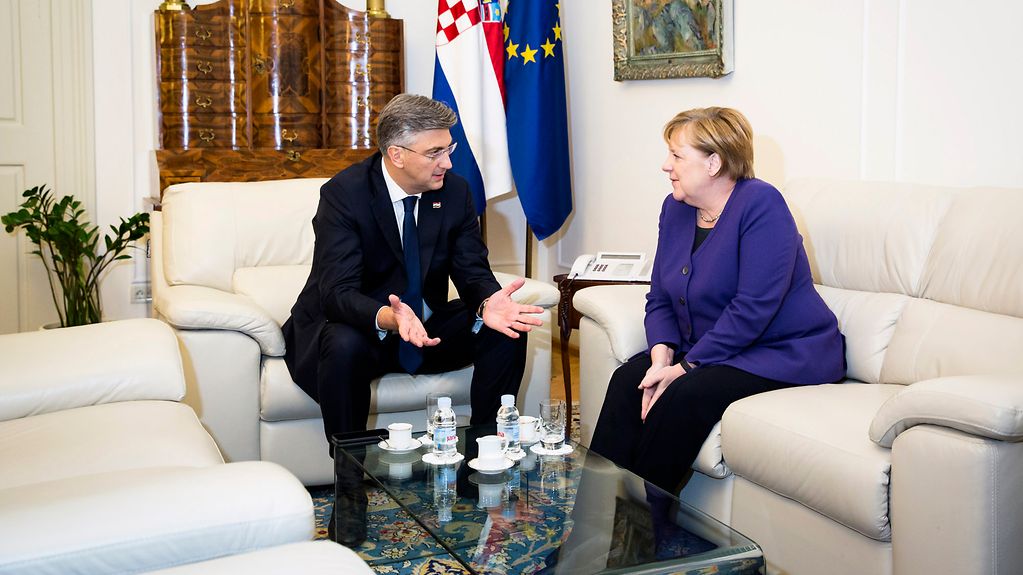Chancellor visits Croatia
Brexit, migration, finance –the Chancellor’s meeting with the Croatian Prime Minister in Zagreb focused on European issues. On 1 January 2020, Croatia will be taking over the rotating Presidency of the Council of the European Union, which it will then pass on to Germany six months later.

Common priorities for Europe - Croatian Prime Minister Andrej Plenković and Chancellor Angela Merkel during their meeting in Zagreb
Photo: Bundesregierung/Steins
Next year, Croatia and Germany will be able to provide important impetus for the work of the European Union with their consecutive presidencies. "That makes it very important that we cooperate closely and very good that we do so," stressed Chancellor Angela Merkel following a meeting with Croatia’s Prime Minister Andrej Plenković in Zagreb.
Germany will support the agenda of the Croatian Presidency "fully and wholeheartedly". Problems that Croatia solves, need not be solved by Germany. Zagreb and Berlin, said the Chancellor, have "the same priorities, as regards the task ahead".
EU needs a "forward-looking budget"
The agenda for the coming year will firstly involve shaping the UK’s withdrawal from the EU. "We will be working very intensively" on future relations with the United Kingdom – the delay in the UK’s departure means that less and less time has been available to focus on the future relationship.
A second priority for the EU in 2020 will be the medium-term financial perspective. Angela Merkel pointed out that this will involve "balancing very divergent interests". The EU, she said, needs a "forward-looking budget that takes into account new responsibilities". These include contacts with Africa, as well as research and innovation.
EU-Turkey Agreement very important
During their Presidencies of the Council of the European Union, Croatia and Germany will also be addressing migration and European efforts to reduce illegal migration. The Chancellor underscored her goal of preserving the Schengen Area and preventing "every state returning to a purely national role". In this context, Angela Merkel and Andrej Plenković also discussed the EU-Turkey Agreement.
"Only this agreement will truly enable us to discuss the matter properly," explained the Chancellor. It might be necessary to accord Turkey "more assistance for all the work it has, providing for 3.5 million refugees it has taken in". "I would be prepared to grant that," stressed Angela Merkel.
Accession prospects for the Western Balkan states
Finally, Angela Merkel and Andrej Plenković discussed the future structure of EU accession processes – partly with a view to the initiation of accession negotiations with North Macedonia and Albania. Croatia, as a new member state, has particularly valuable experience to contribute in this regard, having gone through the process itself comparatively recently.
Germany is ready to engage with France in intensive discussions regarding changes to elements of the accession process. It is important that the EU does not move away from pledges already made. That means that in future too "there must be realistic prospects of accession for the Western Balkan states". Germany, said Angela Merkel, supports Croatia’s plan to hold "a meeting between the Western Balkan states and the full European Union" during its presidency.
What is the Presidency of the Council of the European Union?
The Presidency of the Council of the European Union rotates among all EU member states, with each holding the office in turn for a period of six months. During the six-month period, the country holding the presidency chairs all meetings at every level of the European Council. It is responsible for moving forward the deliberations of the Council regarding EU legal provisions and for the continuity of the EU agenda and cooperation among member states. Find out more here.